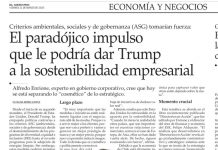Fuente: Forbes
Autor: Michael Peregrine
Isn’t the purpose of summer to take a break, to put down the briefing book and to take a pause from the pressures of board service and monitoring portfolios? As a general rule, maybe. But in 2019, not so much. For just as the weather has been wild, so has been the world of corporate governance. Over the last six months a combination of social, political, regulatory and constituent pressures have rattled conventional fiduciary wisdom in unprecedented ways, including the following:
Forgetting Enron’s Lessons. The smartest guys in the room—those people willing to push the envelope too far—are still around. Just read the papers! They’re the ones willing to operate with few boundaries in the grey zones. The ones who aren’t worried about the moral issue. Memories of Enron and Sarbanes are fading in the boardroom. Governance leadership can, and perhaps should, consider re-emphasizing a tone at the top approach to ethical standards within the organization.
Where Was the Board? There’s a new call for directors to focus on the adequacy of their decision-making process. It’s seen clearly in highly public controversies involving product and public safety and consumer rights. In these situations, the media—and others—are zeroing in on the board’s role, its decision making process, its reliance on executives and whether it caught red flags of harm and danger. In times of corporate controversy, board conduct is increasingly under the microscope.
Director Engagement. A new emphasis on director engagement is coming from courts, regulators, governance thought leaders and asset managers. The big picture concern is on the quality of director attentiveness and commitment. Do they have the necessary time and energy? More focused issues are with overboarding (whether directors are serving on too many boards) and with the distractions presented by the director’s day job and his/her personal life.
Purposeness. Social responsibility is now becoming a component of engaged governance discourse. There is an increasing level of recognition that financial performance may indeed be related to social purpose, and that society is increasingly looking to the private sector for responses to societal concerns. The relationship between corporate social purpose and long-term growth should prompt a meaningful conversation between the board and the CEO.
Culture as a Go-To ‘Beef’. This is much more than addressing critical issues associated with harassment, gender equality and enforcing codes of conduct. It’s about recognizing the broader and crucial obligation of the board to exercise oversight responsibility for organizational culture. Increasingly, boards are being subjected to allegations by third parties as being insensitive to, or ignorant of, systemic organizational cultural concerns. It is a risk that should be anticipated by governance.
Repurposing Compliance. In this business environment, everything evolves, including sacrosanct compliance programs. Increasingly, large corporations are pursuing efforts to recalibrate organizational compliance efforts to be more responsive to factors such as corporate growth, global footprint, evolving leadership duties, and implementation of formal enterprise risk functions. To better identify and manage existing and emerging legal, regulatory, and reputational risks, compliance programs are changing.
Organizational Justice. It’s popping up everywhere, from the technology behemoths, to on-line retailers, to colleges and universities and to consulting firms. Large segments of the workforce are increasingly willing to promote internally—by boycott or otherwise—what they perceive to be socially responsible practices for the company’s pursuit. The board should be prepared to identify, and respond as appropriate to, these initiatives, whether they are just causes consistent with concepts of organizational justice, or more focused on political ideology.
Disruption Accelerates. Is any industry immune? Disruption reigns, from health care, to retail, to newspapers and to the movies and entertainment. Even the original disrupters are now themselves being disrupted! The board must own the recognition of, planning for and response to disruption. The Board can’t punt it to management due to concerns with complexity or the tendency to be deferential. Oversight of disruptive industry developments is an essential responsibility of corporate governance.
Conflicts Complexities. It’s become hard to ignore the increasing prevalence of boardroom conflicts of interest controversies across industry sectors (and in government service). They range from compromised CEOs weighing in on a merger process, to director-as-vendor relationships, to dual loyalties and to inadequate disclosure. The duty of loyalty, and leaders’ sensitivity to this duty, are seemingly under siege in an evolving and transformative economy.
Progressive Politics and Boards. It’s time to take the progressive candidates-and their views on business and governance-very seriously. These include the possible federalization of large corporations, corporate “public benefit” requirements, ramped-up antitrust regulation, statutory diversity requirements and employee representation on the board of directors. Attentive boards should expect these views to feature prominently in the 2020 election discourse, and plan for their potential adoption.
What’s In a Title? From the board’s perspective, a lot. The general counsel has evolved into “the chief legal officer.” the human resources director into the “chief people officer,” and the director of marketing into the “chief brand officer.” And there’s the whole set of “new wave” executive titles such as the chief customer officer, the chief solutions officer, the chief trust officer…The board can’t laugh these off; it must understand the role, the hierarchical position and what it all says about the company’s business evolution.
There have been seismic shifts in perspectives on effective corporate governance during the first six months of 2019. Boards will be expected to recognize, monitor and respond to these new perspectives as they deem necessary and relevant.












